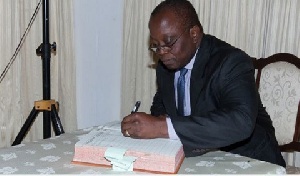The Auditor-General (A-G) has issued more Certificates of Indebtedness to individuals towards the recovery of State funds, which they directly or indirectly caused its wrong utilisation, bringing the total to more than 35.
About 100 cases are being processed to determine which ones to be considered for surcharge, an official of the Legal Department of the Auditor-General’s Office told the Ghana News Agency in an interview, on Tuesday.
The certificate covers those involved in cash irregularities and failure to account for State funds.
The offenders are required to refund the money with interest in line with the prevailing Bank of Ghana interest rate.
However, they have up to 60 days to pay up or otherwise go to court to challenge the Auditor General, who has the sole mandate to issue the Certificate.
The GNA wanted to find out the progress of work since Mr Daniel Yaw Domelevo, the A-G, announced at a media briefing, on August 2, that 11 Certificates of Indebtedness would have been issued by the close of that day.
The move is to enforce the constitutional provision that mandates him to disallow public expenditures that are contrary to the law and surcharge same against persons responsible.
Article 187, Clause 7(b) (i) of the states: "... the Auditor-General may disallow any item of expenditure, which is contrary to law and surcharge the amount of any expenditure disallowed upon the person responsible for incurring or authorising the expenditure.”
This is reinforced in the Audit Service Act 2000 (Act 584) Section 17(1-2).
The official commended the Supreme Court, Occupy Ghana and the Auditor – General for their joint efforts in kick-starting the enforcement of the law to protect the public purse.
He said the issuance of the indebtedness certificates had generated a lot of interest and caution among both private and public officers, especially in the district assemblies, because many persons did not want to fall foul of the law.
“People are now keen to probe suspicious expenditures in the past and to disassociate themselves from non-existing procurements,” he stated. “This is a good development for Ghana, which must be supported by all stakeholders, including the media.”
The Auditor-General, with his team, he said, would follow the due process of law to ensure that both private and public persons who were culpable settled their respective debts.
However, he said, with the backlog of cases to be cleared, the Government should authorise the engagement of adequate competent personnel to help with the professional auditing and the process of recovering wrongly applied State funds.
The A-G has put together a team of personnel who have been trainned to conduct forensic audit and build competent cases, which could be successfully prosecuted should it become necessary.
In June this year, the Supreme Court ordered the Auditor-General to quickly begin surcharging persons found to have misappropriated State funds.
This follows a suit filed by Occupy Ghana, a pressure group, to compel the Auditor-General to honour this responsibility as is enshrined in the 1992 Constitution.
The reliefs, sought which were all granted by the Court, are that: “(1) That upon a true and proper interpretation of Article 187(7)(b)(i) of the Constitution, the Auditor-General is bound to issue a disallowance or surcharge where there has been any item of expenditure on behalf of the Government that is contrary to law, so that the amount unlawfully expended is recovered from the person who was responsible for, or authorised, the expenditure disallowed;
“(2) That upon a true and proper interpretation of Article 187(7)(b)(ii) of the Constitution, the Auditor-General is bound to issue a disallowance and surcharge where any person fails to bring any sum into Government account, so that the amount is recovered from the person by whom the amount should have been brought into account.
“(3) That upon a true and proper interpretation of Article 187(7)(b)(iii) of the Constitution, the Auditor-General is bound to issue a disallowance and surcharge where the Government suffers or incurs a loss or deficiency through the negligence or misconduct of any person, so that the value of the loss or deficiency is recovered from that person (whether or not a public servant);
“(4) That the failure, refusal or neglect by the Auditor-General to every issue any disallowances and surcharges in respect of (i) unlawful items of expenditure, (ii) amounts not brought into account, and (iii) losses and deficiencies incurred through negligence and misconduct as set out in successive Reports of the Auditor-General issued since the coming into force of the Constitution are violations by the Auditor-General of his/her obligations under the Constitution; and
“(5) That the Auditor-General be ordered to issue disallowances and surcharges to and in respect of all person and entities found in successive Reports of the Auditor-General to have been responsible for or to have authorised unlawful items of expenditure, not bringing sums into account or having caused loss or deficiency through negligence or misconduct, in accordance with Article 187(7)(b) of the Constitution.”
The Audit Service would, therefore, be reviewing its annual reports from the Fourth Republican era to open old cases to check irregularities.
General News of Wednesday, 6 September 2017
Source: GNA

















